Since the latest Windows 10 1809 update we can no longer open a USB HID keyboard-like device of ours using CreateFile. We reduced the problem to this minimal example:
#include <windows.h>
#include <setupapi.h>
#include <stdio.h>
#include <hidsdi.h>
void bad(const char *msg) {
DWORD w = GetLastError();
fprintf(stderr, "bad: %s, GetLastError() == 0x%08x\n", msg, (unsigned)w);
}
int main(void) {
int i;
GUID hidGuid;
HDEVINFO deviceInfoList;
const size_t DEVICE_DETAILS_SIZE = sizeof(SP_DEVICE_INTERFACE_DETAIL_DATA) + MAX_PATH;
SP_DEVICE_INTERFACE_DETAIL_DATA *deviceDetails = alloca(DEVICE_DETAILS_SIZE);
deviceDetails->cbSize = sizeof(*deviceDetails);
HidD_GetHidGuid(&hidGuid);
deviceInfoList = SetupDiGetClassDevs(&hidGuid, NULL, NULL,
DIGCF_PRESENT | DIGCF_INTERFACEDEVICE);
if(deviceInfoList == INVALID_HANDLE_VALUE) {
bad("SetupDiGetClassDevs");
return 1;
}
for (i = 0; ; ++i) {
SP_DEVICE_INTERFACE_DATA deviceInfo;
DWORD size = DEVICE_DETAILS_SIZE;
HIDD_ATTRIBUTES deviceAttributes;
HANDLE hDev = INVALID_HANDLE_VALUE;
fprintf(stderr, "Trying device %d\n", i);
deviceInfo.cbSize = sizeof(deviceInfo);
if (!SetupDiEnumDeviceInterfaces(deviceInfoList, 0, &hidGuid, i,
&deviceInfo)) {
if (GetLastError() == ERROR_NO_MORE_ITEMS) {
break;
} else {
bad("SetupDiEnumDeviceInterfaces");
continue;
}
}
if(!SetupDiGetDeviceInterfaceDetail(deviceInfoList, &deviceInfo,
deviceDetails, size, &size, NULL)) {
bad("SetupDiGetDeviceInterfaceDetail");
continue;
}
fprintf(stderr, "Opening device %s\n", deviceDetails->DevicePath);
hDev = CreateFile(deviceDetails->DevicePath, 0,
FILE_SHARE_READ | FILE_SHARE_WRITE, NULL,
OPEN_EXISTING, 0, NULL);
if(hDev == INVALID_HANDLE_VALUE) {
bad("CreateFile");
continue;
}
deviceAttributes.Size = sizeof(deviceAttributes);
if(HidD_GetAttributes(hDev, &deviceAttributes)) {
fprintf(stderr, "VID = %04x PID = %04x\n", (unsigned)deviceAttributes.VendorID, (unsigned)deviceAttributes.ProductID);
} else {
bad("HidD_GetAttributes");
}
CloseHandle(hDev);
}
SetupDiDestroyDeviceInfoList(deviceInfoList);
return 0;
}
It enumerates all HID devices, trying to obtain the vendor ID/product ID for each one using CreateFile over the path provided by SetupDiGetDeviceInterfaceDetail and then calling HidD_GetAttributes.
This code runs without problems on previous Windows versions (tested on Windows 7, Windows 10 1709 and 1803, and the original code from which this was extracted works since always from XP onwards), but with the latest update (1809) all keyboard devices (including ours) cannot be opened, as CreateFile fails with access denied (GetLastError() == 5). Running the program as administrator doesn't have any effect.
Comparing the output before and after the update, I noticed that the devices that now cannot be opened gained a trailing \kbd in the device path, i.e. what previously was
\\?\hid#vid_24d6&pid_8000&mi_00#7&294a3305&0&0000#{4d1e55b2-f16f-11cf-88cb-001111000030}
now is
\\?\hid#vid_24d6&pid_8000&mi_00#7&294a3305&0&0000#{4d1e55b2-f16f-11cf-88cb-001111000030}\kbd
Is it a bug/new security restriction in the latest Windows 10 version? Was this code always wrong and it worked by chance before? Can this be fixed?
Update
As a desperate attempt, we tried to remove the \kbd from the returned string... and CreateFile now works! So, now we have a workaround, but it would be interesting to understand if that's a bug in SetupDiGetDeviceInterfaceDetail, if it's intentional and if this workaround is actually the correct thing to do.




